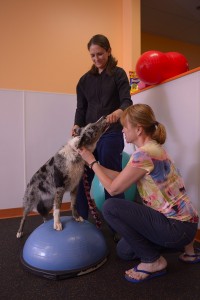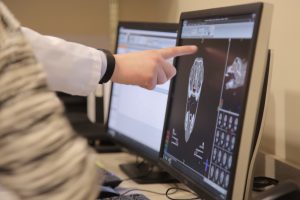November is Pet Diabetes Month: What are the Signs of Diabetes in House Pets?
November is National Diabetes Month, which makes this month a great time to talk about pet diabetes and its ability to affect your cat or dog’s health. While diabetes may seem like a human disease, pet diabetes affects one in every two hundred cats and is one of the most common diseases in dogs—with some breeds, such as Samoyeds, dachshunds, poodles, Beagles, and Schnauzers—being over-represented among those dogs affected. Diabetes is seen twice as much in female dogs as in males, while male cats are more prone to diabetes. While juvenile diabetes can occur in pets, it’s fairly rare—usually diabetes affects older pets, that is, dogs aged seven to nine years old, and cats aged eight to thirteen. Pet diabetes can take the form of Type I, a lifelong condition where the body doesn’t make enough insulin (more common in dogs) or Type II, an often temporary condition where the body makes inadequate insulin (more common in cats).
Month, which makes this month a great time to talk about pet diabetes and its ability to affect your cat or dog’s health. While diabetes may seem like a human disease, pet diabetes affects one in every two hundred cats and is one of the most common diseases in dogs—with some breeds, such as Samoyeds, dachshunds, poodles, Beagles, and Schnauzers—being over-represented among those dogs affected. Diabetes is seen twice as much in female dogs as in males, while male cats are more prone to diabetes. While juvenile diabetes can occur in pets, it’s fairly rare—usually diabetes affects older pets, that is, dogs aged seven to nine years old, and cats aged eight to thirteen. Pet diabetes can take the form of Type I, a lifelong condition where the body doesn’t make enough insulin (more common in dogs) or Type II, an often temporary condition where the body makes inadequate insulin (more common in cats).
While there’s no cure for pet diabetes, with correct care and early diagnosis by your veterinarian in the greater Philadelphia area it is a disease that can be managed, allowing your pet to live a long and healthy life. Pet owners should be aware of the following symptoms of diabetes in pets, and take their pet in if they suspect diabetes:
- Excessive Thirst. This is a big one, and often an early warning sign. If your pet is draining his or her water bowl more frequently all of a sudden, it may be time for a visit to the vet.
- Excessive and Inappropriate Urination. This often goes hand-in-hand with excessive thirst. When your pet drinks more, they urinate more, and this may lead to dogs inappropriately eliminating in the house, or cats marking areas other than their box.
- Blindness and/or Cataracts. Any new vision problems should prompt a pet owner to visit their local veterinarian or a specialty veterinary healthcare hospital. Specifically, the whitening of the eye in animals may be a sign of diabetes.
- If your pet is suddenly unusually ravenous, it may be time for a checkup.
- Lethargy or Weakness. All pets slow down with age, but if you notice your pet is lethargic, or unable or unwilling to do the things they used to love, take them in.
- Dandruff or Oily Coat. Changes to your pet’s coat can be a good indicator of a health problem in general, but they can also specifically indicate diabetes.
If you suspect your pet has diabetes, please make an appointment wit
h your local veterinarian as soon as you can. It is likely they can help, or they can refer you to specialists like those at VRC in Malvern, PA. Diabetes can be managed with injections of insulin, but it can be fatal if it goes untreated.
VRC is a specialty veterinary healthcare hospital. We’re open 24/7, 365 days a year. Referring veterinarians can count on us to give great advice to families with pets suffering from diabetes, so give us a call.






 Email
Email own a dog, you become responsible for their health. Sometimes that means taking your canine companion in for regular checkups at their
own a dog, you become responsible for their health. Sometimes that means taking your canine companion in for regular checkups at their  While it is always best to leave diagnosing a pet’s illness to professionals, it’s good to keep an eye on your pet’s health and be aware of telltale signs that your pet isn’t feeling well. Cancer can be a concern for many pet owners when a pet seems to be doing poorly, so in the following article we’ll discuss what to look for, and how to talk to your
While it is always best to leave diagnosing a pet’s illness to professionals, it’s good to keep an eye on your pet’s health and be aware of telltale signs that your pet isn’t feeling well. Cancer can be a concern for many pet owners when a pet seems to be doing poorly, so in the following article we’ll discuss what to look for, and how to talk to your  Cancer is never a good word to hear from a veterinarian. It’s frightening, and often leaves pet owners feeling powerless, frustrated, and unsure of what to do for their beloved companion. For pet owners in the Philadelphia area, VRC in Malvern, PA is here to support you every step of the way. Not only is our
Cancer is never a good word to hear from a veterinarian. It’s frightening, and often leaves pet owners feeling powerless, frustrated, and unsure of what to do for their beloved companion. For pet owners in the Philadelphia area, VRC in Malvern, PA is here to support you every step of the way. Not only is our 
